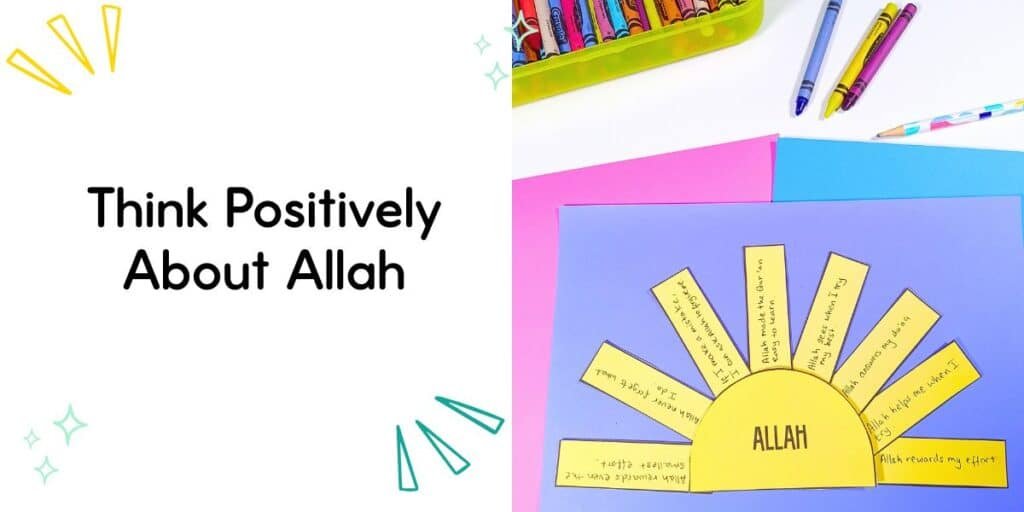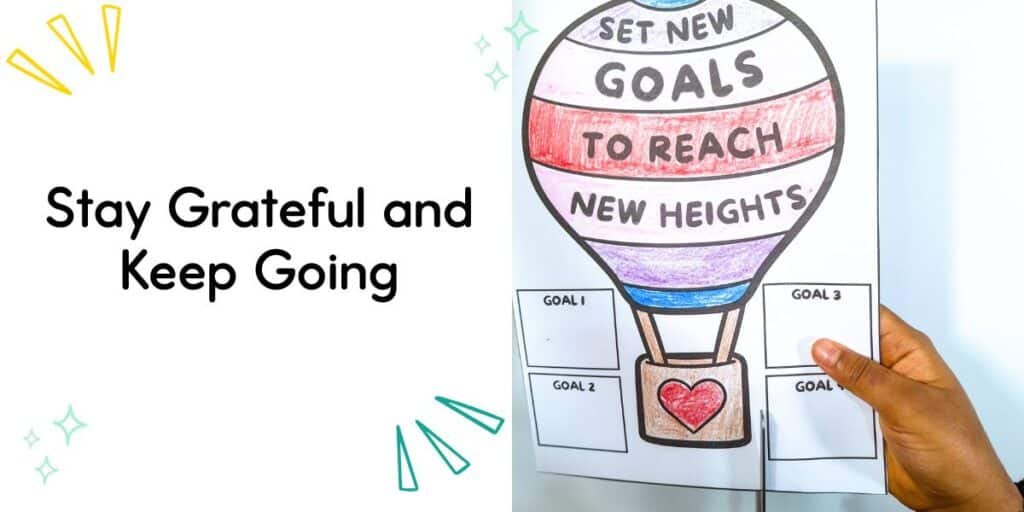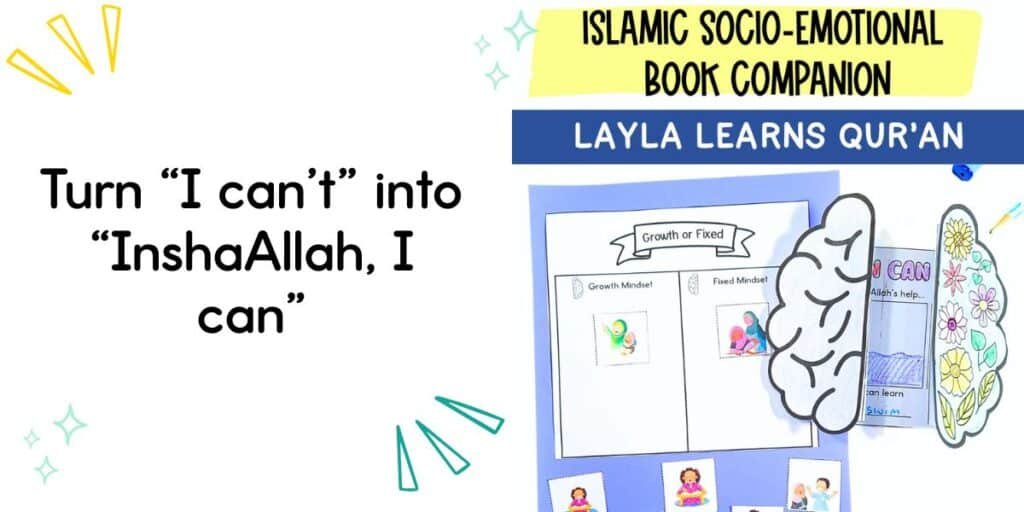When people talk about “growth mindset,” they’re usually referring to the work of psychologist Carol Dweck, who introduced the idea that intelligence and abilities aren’t fixed — they can grow with effort, learning, and persistence. Children who understand this are more resilient, more likely to persevere, and more open to feedback.
But most secular conversations about growth mindset leave something out — the Creator. As Muslims, we know that Allah created the brain. He created our abilities. And He is the One who can help us grow, change, and improve. A truly powerful Islamic growth mindset for children must include belief in Allah.
Why Islamic Growth Mindset for Children Matters — Even in the Brain
Modern neuroscience backs up Carol Dweck’s findings: believing you can get smarter doesn’t just boost motivation — it actually changes the brain. For example, studies show that children who believe their abilities can grow develop stronger neural pathways and greater brain plasticity compared to those with a fixed mindset. In other words, when we believe we can grow, our brains actually grow!
Here are six essential things to teach your Muslim child about Islamic growth mindset:

1. What Islamic Growth Mindset Really Is
A growth mindset means understanding that talents and intelligence can develop with effort. But as Muslims, we go further: we believe that Allah created us and He can help us grow. We aren’t stuck. Allah can change our hearts, strengthen our minds, and increase us in knowledge and ability.

2. Mistakes Help Us Learn
Everyone makes mistakes — even the Prophets. Prophet Yunus (alayhis-salam) made a mistake and turned to Allah with du’aa. Prophet Adam (alayhis-salam) made a mistake and sought Allah’s forgiveness. We can too.
Some mistakes are sins — like lying or taking something without permission. These need repentance. Others are unintentional — like writing the wrong word or spilling a drink. Both kinds are part of learning.
When kids understand this, they’re more likely to try, to ask for help, and to grow from their experiences.

3. Perseverance is a Prophetic Quality
Sometimes things feel too hard. But that’s when perseverance matters most. Teach your child to try different strategies, be patient, and trust that Allah sees and rewards every effort.
Prophet Nuh (alayhis-salam) called his people for 950 years. He kept going. Your child can too — whether it’s reading Qur’an, memorising a surah, or just finishing a difficult task.
Remind them: Allah never gives a soul more than it can bear.

4. Think Positively About Allah
A strong Islamic growth mindset for children is rooted in husn al-dhann — having good thoughts about Allah. When a child believes Allah is merciful, helpful, and generous, they are more likely to try again after failure.
The Prophet (ﷺ) said in a Hadith Qudsi:
“Allah says: ‘I am just as My slave thinks I am… and I am with him if he remembers Me… if he comes to Me walking, I go to him running.’” (Sahih al-Bukhari 7405)
Positive thinking isn’t just optimism — it’s belief in the mercy and nearness of Allah.

5. Effort is Rewarded in Islam
Only Allah controls the outcome — but He loves sincere effort. This is especially important when it comes to learning Qur’an or Islamic knowledge.
Whether your child succeeds or struggles, Allah sees it. And He rewards them for trying — not just for getting it right.
Let your child know: Allah sees how hard you try — and He is the most generous in reward.

6. Stay Grateful and Keep Going
When your child does succeed, remind them: this was a gift from Allah. Gratitude keeps the heart humble. And consistency keeps them growing.
Success isn’t the end — it’s a stepping stone. We stay connected to the Qur’an, we keep learning, and we remember that growth is a lifelong journey.

If you’d like support in teaching these concepts in a practical, gentle way, inshaAllah my Social-Emotional Learning (SEL) Unit — based on the story Layla Learns Qur’an — will help.
It’s designed for young children and uses the story of Layla’s Qur’an struggles to teach Islamic growth mindset for children. Because talking about a character’s challenges makes it easier for kids to explore their own feelings too — like frustration, fear, or not feeling “good enough.”
📘 This blog is a guide to building an Islamic growth mindset for children in a way that centres belief in Allah, His help, and His reward.
FAQ: Islamic Growth Mindset for Children
What is a growth mindset in Islam?
It’s the belief that improvement is possible through effort and du’aa, trusting that Allah rewards every sincere attempt.
Can children learn a growth mindset through the Qur’an?
Yes. Prophet stories show children that struggle, mistakes, and perseverance are part of a believer’s journey.
Is effort rewarded even if there’s no success?
Yes. Islam teaches that Allah sees and rewards our efforts even if we don’t succeed immediately.
Free resources to help you teach kids about Islam
I hope you have found these 6 things to teach your child about Islamic Growth Mindset helpful. If you would like to get a FREE resource to help connect Muslim kids to the Qur’an then join the mailing list here to download a fun activity pack about one of the Animals in the Qur’an, the ant, and gain access to the free resource library.
Here is another blog post you may be interested in:
5 Ways Islamic Stories for Kids Build Emotional Intelligence (and a Love for Allah)







3 Comments
I woke up reading all of this really important literature. I’m thinking about becoming Islam.
Salams, How do I get the resources- Printables to teach the Muslim MInd Set? Jazak Allah Khairen for creating these material
Wa aliakum asalaam wa rahmatullah! Jazakallah khair for your kind comment. Here’s the link to the Grwoth Mindset Unit: https://teachmeislam.org/product/islamic-sel-activities-layla-learns-quran/ Hope that helps!